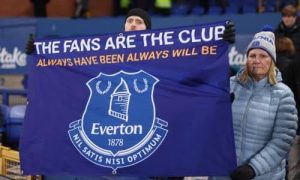

Farhad Moshiri, the club’s owner, previously stated that the club was ‘strong’ enough to fund the stadium, but now they require operating financial injections. At Everton’s annual general meeting in January 2019, the club’s owner, Farhad Moshiri, made a startling commitment. When asked about the club’s plans to build a 52,888-seat stadium at Bramley-Moore Dock, the club’s majority stakeholder said, “I’ll throw as much money as needed. Private markets will supply £350 million, naming rights will offer further funds, and there may be a £100 million equity gap.”
He continued, “[This club] is enough strong to see the idea through. It’s not a luxury; we need to get it done. “If we want to be a big club, we need a modern stadium, which we will get.” Moshiri was still reading from the same script around 15 months ago, in January 2023. He told Everton’s Fan Advisory Board: “The club is not for sale, but I have been speaking with high-quality investors to bridge a stadium gap. I can do it myself; my goal is to bring great sports investors to Everton, which is one of the reasons fans want to see improvement: more talent. We are getting close to finalizing a deal.”
Those monitoring the club’s operations at the time would have noticed the signals that have led to Everton now hiring a leading company of restructuring and bankruptcy advisers to assist with their massive debts. One of the first warning signals was the club’s statement a year after Moshiri’s promise to “throw as much money as needed” into the stadium project. Everton made a big deal out of what appeared to be a crucial appointment in January 2020, employing the US investment bank JP Morgan and Japan’s largest bank, MUFG, to assist raise the £500 million required to build the ground.
The two are such well-known figures in finance that the combination appeared to be one of the season’s most noteworthy signings. However, the partnership became an albatross for the club, since the combined efforts of those two massive financial giants failed to get funding for the project after nearly four years of attempting. According to experts, the standard approach of financing new stadiums is to secure all of the necessary finances before a shovel is placed in the ground, even though clubs generally refinance projects at a later date.
Without the security of that investment, and with former well-known lenders like as Santander and Industrial and Commercial Bank of China no longer lending to the club, Everton were forced to borrow from a variety of sources to meet its working capital needs. Everton created an £80 million “credit facility” in September 2019 with a business named Rights and Media Funding (RMF), a Cheshire-based organization with zero employees that borrows funds from opaque offshore firms to lend to football clubs. The debt to RMF quickly escalated.
RMF is currently Everton’s top lender, owing over £225 million with an interest rate believed to have reached 10.25 percent. That implies hundreds of thousands of pounds are leaving the club every week. RMF has secured the financing by owning property near Goodison Park. It also contains stipulations in its agreement that are said to have allowed it to block a planned purchase by the US sports investment firm MSP Capital last year. Neither the RMF nor the MSP have previously responded to the Guardian on that point.
MSP itself, together with its partners, Evertonian merchants Andy Bell and George Downing, is another major creditor. According to corporate documents filed in the Isle of Man, the consortium has financed the club around £160 million, backed by the new stadium development, as well as a charge over more than half of Moshiri’s 94% interest in the team. Goodison Park’s finances are so tight that MSP could have taken control of Moshiri’s shares – and thus the club – last month because prospective bidder 777 Partners failed to repay MSP on time as part of the buyout.
In the seven months since attempting to complete its Everton takeover, 777 has lent Everton over £200 million to keep the club afloat. The ongoing need for working capital injections, combined with the enormity of Everton’s debt burden in comparison to its assets, is reported to be causing worry among club directors. When a company runs into financial difficulties, directors must seek professional assistance and regularly monitor its accounts to ensure that it does not trade while insolvent.

Leave a Reply